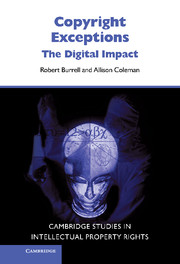Book contents
- Frontmatter
- Contents
- Preface
- List of abbreviations
- Table of cases
- Table of statutes
- Introduction
- Part I Where we are
- 1 Copyright and freedom of expression
- 2 Fair dealing for the purposes of criticism, review and news reporting and related exceptions
- 3 The public interest defence
- 4 Exceptions applying to education, research and private study
- 5 The library and archive provisions and related exceptions
- Part II How we got here
- Part III Where we go from here
- Appendices
- Copyright, Designs and Patents Act 1988, Part I, Chapter III: ‘Permitted Acts’
- Copyright, Designs and Patents Act 1988, s. 296ZE and Schedule 5A
- Directive 2001/29/EC of the European Parliament and of the Council of 22 May 2001 on the harmonisation of certain aspects of copyright and related rights in the information society
- United States Copyright Act 1976, 17 USC, s. 107
- Bibliography
- Index
- Cambridge Studies in Intellectual Property
5 - The library and archive provisions and related exceptions
Published online by Cambridge University Press: 04 March 2010
- Frontmatter
- Contents
- Preface
- List of abbreviations
- Table of cases
- Table of statutes
- Introduction
- Part I Where we are
- 1 Copyright and freedom of expression
- 2 Fair dealing for the purposes of criticism, review and news reporting and related exceptions
- 3 The public interest defence
- 4 Exceptions applying to education, research and private study
- 5 The library and archive provisions and related exceptions
- Part II How we got here
- Part III Where we go from here
- Appendices
- Copyright, Designs and Patents Act 1988, Part I, Chapter III: ‘Permitted Acts’
- Copyright, Designs and Patents Act 1988, s. 296ZE and Schedule 5A
- Directive 2001/29/EC of the European Parliament and of the Council of 22 May 2001 on the harmonisation of certain aspects of copyright and related rights in the information society
- United States Copyright Act 1976, 17 USC, s. 107
- Bibliography
- Index
- Cambridge Studies in Intellectual Property
Summary
The libraries and archive sections of the 1988 Act, even in their amended form, are complex and old-fashioned, and they draw unnecessary and inappropriate distinctions between institutions in a sector that has changed rapidly over recent years. However, the outcome of the law reform process in 2003 has not been unwelcome to people working within the sector. Those who run libraries and archives were expecting far worse, and since the 2003 Regulations came into force there has been a collective sigh of relief. This relief may, however, be short-lived, for the changes made to the law in the United Kingdom have been minimal, freezing in time a set of provisions which were long overdue for radical reform.
The libraries and archives sections allow officially sanctioned persons to make copies of a work and, in appropriate circumstances, to supply these copies to other institutions and to individuals – typically, a librarian supplying a library reader. The person making the copy will therefore be a professional person working in a sector traditionally held in special regard by the state as a holder and provider of information. Public policies regarding dissemination and preservation of knowledge, culture and heritage for the public benefit therefore come into play. The question to be considered is the extent to which furtherance of these policies justifies the provision of copyright exceptions or, to load the question rather differently, the extent to which copyright protection is justified in circumstances in which it interferes with the work of libraries and archives.
Information
- Type
- Chapter
- Information
- Copyright ExceptionsThe Digital Impact, pp. 136 - 164Publisher: Cambridge University PressPrint publication year: 2005
